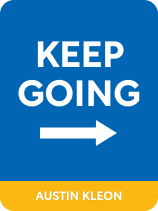

This article is an excerpt from the Shortform book guide to "Keep Going" by Austin Kleon. Shortform has the world's best summaries and analyses of books you should be reading.
Like this article? Sign up for a free trial here .
What are examples of outcome goals? Why should you avoid pursuing outcome goals?
According to Austin Kleon in his book Keep Going, outcome goals are unhealthy because they focus more on the result and less on the process. This especially applies to people working on a creative project.
Here are two outcome goals examples and why Kleon says you should avoid them.
Examples of Outcome Goals
Outcome goals are unhealthy because they minimize what’s most important: making creative work that you enjoy or are passionate about. By focusing more on the end product, you focus less on the actual creative process and the things you enjoy about it. In addition, outcome goals pressure you to constantly churn out more work to achieve those results—leading to burnout.
(Shortform note: Some psychologists disagree with Kleon’s claim that results-based thinking leads to burnout. They argue that you can healthily pursue specific goals if you keep a mindset of “realistic optimism,” or the understanding that you can achieve your goals, but doing so won’t always be easy. This mindset prevents you from putting too much pressure on yourself when things get hard, but it also helps you stay motivated by thinking about the achievement you’re working toward. By preventing pressure and adding motivation, realistic optimism can keep you from burning out while pursuing a results-based goal.)
Kleon notes two outcome goal examples, and he offers strategies for avoiding them:
Money
Kleon warns against overly monetizing creative work. Turning a hobby or passion into an income source turns what was once a release from pressure into an obligation that adds pressure. This doesn’t mean you can’t make a living doing creative work—but if you do, increasing your income shouldn’t be your main goal. Instead, maintain realistic expectations of how much you’ll earn, and live within those means so that you don’t have to focus on making more money through your creative work. This could mean keeping a tight budget and doing just creative work for money, or it could mean keeping your day job.
(Shortform note: While Kleon acknowledges that a day job may be necessary for relieving financial stress while you pursue your creative ambitions, many artists see their day jobs as more than just a way to pay the bills—they actively contribute to the creative process. Artists like Andy Kaufmann and Sujatha Gidla found creative inspiration from interacting with the world around them, working as a busboy and subway conductor, respectively. From this perspective, trying to make a living on creative work doesn’t just add stress—it also limits your exposure to creativity-stimulating experiences.)
Approval
Kleon also warns against doing creative work for approval or recognition—for example, to earn likes or shares on social media. If you pursue approval, you’ll start making work that other people enjoy instead of work that you enjoy. You’ll also feel inadequate or upset if some creative work doesn’t get enough likes or shares. To avoid pursuing approval, Kleon recommends that you delay checking the response to social media posts of your creative work—by paying less attention to approval, you’ll start caring about it less. Additionally, he suggests making some creative work that you never post at all.
(Shortform note: While Kleon suggests that overly valuing the judgments of others can lead to feelings of inadequacy, psychological research goes further by suggesting it can lead to “creative mortification”: giving up on a creative pursuit entirely. One study found that those who believe that the negative judgments of others reflect poorly on their own ability are more likely to give up on a creative pursuit altogether. This suggests that taking other people’s opinions too seriously can not only damage but also destroy creative motivation.)

———End of Preview———
Like what you just read? Read the rest of the world's best book summary and analysis of Austin Kleon's "Keep Going" at Shortform .
Here's what you'll find in our full Keep Going summary :
- How to stay creative even when you feel stressed or burnt out
- Why the process of making art is more important than the outcome
- Why and how to make a creative space to work in






